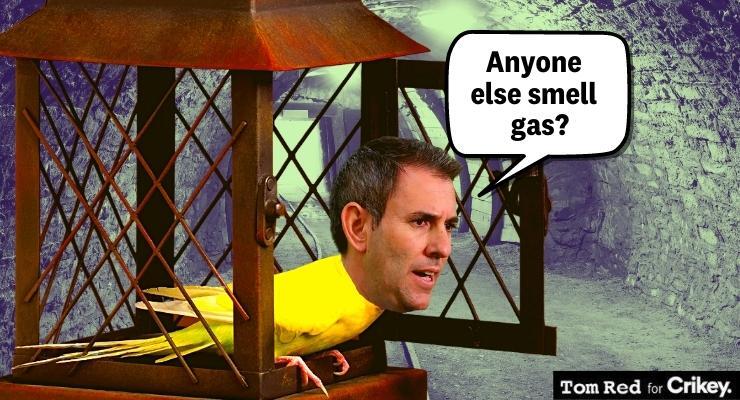
It’s taken a while for Labor to be dragged, very reluctantly, to the idea that the risks of doing nothing on energy company profits might outweigh the risks of taking action.
Despite a wide variety of observers (and the Greens) suggesting a windfall profits tax on energy exporters — or fixing the petroleum rent resource tax (PRRT) — is important not just fiscally but for encouraging voters to endure the pain of higher energy prices, until last week Treasurer Jim Chalmers has stoutly resisted fixing what is currently the most expensive tax rort in Australia: the failure of big gas exporters to pay sufficient, or in many cases any, tax or royalty while they make tens of billions in profits.
Informing Labor’s reluctance — such a contrast to its welcome, gung-ho approach to industrial relations reform — is its experience last time it brought on a windfall profits tax on the extractive sector. It’s one Chalmers saw up close and personal in then treasurer Wayne Swan’s office as the resource super profit tax (RSPT) plunged the Rudd government into a world of trouble and contributed to the removal of Rudd himself.
Things are a little different now: these are fossil fuels, not iron ore; these companies are paying tuppence in tax while consumers and other businesses pay through the nose for gas; major manufacturers are facing the real threat of closure; and Andrew Forrest is now an avowed enemy of the gas lobby. But the same malignant forces that derailed the RSPT — News Corp, The Australian Financial Review, the extractive sector and its well-funded and well-staffed lobby groups (including the federal Coalition, the biggest resources industry lobby group of all) — would assemble again, and journalists will again begin using that great cliché “a mining tax-style ad campaign”.
That Chalmers is now flagging possible changes to the patently inadequate PRRT regime isn’t thanks to the corporate media. Only smaller outlets like Crikey, Michael West Media and industry publications have been pointing out how useless the PRRT is and the bizarre fact that last week’s budget showed PRRT revenue falling despite a mammoth spike in gas export prices. Nonetheless, well done to the press gallery for finally working out that something is wrong with the way we tax fossil fuels.
Bear in mind, though, that the only reason anything is on the agenda is that Josh Frydenberg — remember him? — asked Treasury to continue work after a review of the PRRT by right-wing economist Mike Callaghan, which led to some marginal prospective changes in the rules around the treatment of capital costs by the previous government. Meaning that, as of right now, the Coalition is responsible for what minimal movement there has been to fix the PRRT.
As with the RSPT and its successor, however, the risk is that significant changes take so long that windfall profits are long in the rearview mirror by the time the changes kick in. Any change to the PRRT will likely not commence until the 2024-25 financial year at the earliest, meaning the likes of Santos, Woodside, Chevron and Shell will keep tens of billions in war profits generated since January.
And any worthwhile changes will elicit screams of sovereign risk, deterring investment and all the garbage we were served up routinely by the AFR and News Corp more than a decade ago.
And yet, try telling voters they’ll just have to cop much higher energy prices while those companies make a fortune and hand out massive rewards to their executives. And all while the climate emergency accelerates. Chalmers might want to ask Treasury to finish that review ASAP.
Are higher energy prices a political dealbreaker for you? Let us know your thoughts by writing to letters@crikey.com.au. Please include your full name to be considered for publication. We reserve the right to edit for length and clarity.








Crikey is committed to hosting lively discussions. Help us keep the conversation useful, interesting and welcoming. We aim to publish comments quickly in the interest of promoting robust conversation, but we’re a small team and we deploy filters to protect against legal risk. Occasionally your comment may be held up while we review, but we’re working as fast as we can to keep the conversation rolling.
The Crikey comment section is members-only content. Please subscribe to leave a comment.
The Crikey comment section is members-only content. Please login to leave a comment.